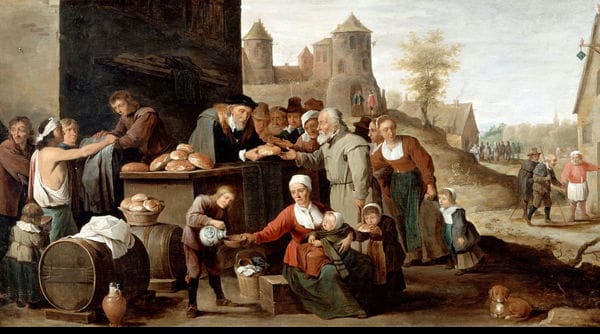It’s the Year of Mercy, Not Compassion!
Pope Francis has declared a Jubilee Year of Mercy will begin tomorrow, December 8, 2015, on the Solemnity of the Immaculate Conception. He has led the way for this with some powerful initiatives, such as giving selected priests, Missionaries of Mercy appointed exclusively by the Holy Father, the power to forgive sins which would normally be reserved to the Holy See.
He is on the right track. But, we may not be…and it’s very important to be clear on what this year means. You see, in our day and age, we have lost track of what constitutes mercy and what constitutes compassion, and the difference between them. The world tends to confuse the two, changing, diluting and conflating them into some amorphous mix of tolerance, political correctness, moral morass, ambivalence, emotionalism, coddling, looking the other way, abrogating responsibilities and justice, and who knows what else. But, the world is wrong, even though mercy and compassion can exist side by side.
Compassion, literally “with passion”, is when we suffer with someone. It’s when we feel their pain…sometimes because we’ve been there ourselves, sometimes because we figuratively put ourselves in their place, imagining what it would be like to suffer a particular loss or difficulty.
- We are compassionate with someone who is ill or has had an operation. We help them get through it with comforting words and actions, with chicken soup, with our presence. We suffer with them.
- We are compassionate with someone who has lost a job. We provide financial support,
 steering work or interviews their way, or starting or contributing to a crowd-sourcing page like “Spledger”, “gofundme” and things of that ilk. We suffer with them.
steering work or interviews their way, or starting or contributing to a crowd-sourcing page like “Spledger”, “gofundme” and things of that ilk. We suffer with them. - We are compassionate with someone who has experienced a death in their family. We are present to them listening to and comforting them and lending aid. We suffer with them.
Mercy is another animal altogether. Mercy is the forgiveness of just debt…and, it is something that is in everyone’s power.
Whoa! Wait a minute. No one owes me anything! Au contraire, my friend! In the Our Father prayer Christ taught, there is a very special passage that calls us to account: “Forgive us our trespasses/debts, as we forgive those who trespass against us/our debtors.” In other words, we all have people who owe us something in one way, shape or form. Every single one of us controls something in this life, even if we are living in poverty, or have renounced earthly possessions for the sake of the Kingdom of God.
 At the very least, we owe the people around us the consideration and respect for their person, and they, likewise, owe us the same. And, that’s just for minimal social intercourse and the functioning of human society! Christianity teaches us much more than this: to see Christ in the other, to love all as we have first been loved by God, to lay down our lives for them. On a much greater scale, an infinite one, this is what God has done for us because He so loved the world. By Jesus’ life, death and resurrection, God has given us a share in the fullness of His divine life. He has condescended to show us mercy and we are to go and do the same, to learn the meaning of the words, “It is mercy I desire!” (cf Matthew 12:7).
At the very least, we owe the people around us the consideration and respect for their person, and they, likewise, owe us the same. And, that’s just for minimal social intercourse and the functioning of human society! Christianity teaches us much more than this: to see Christ in the other, to love all as we have first been loved by God, to lay down our lives for them. On a much greater scale, an infinite one, this is what God has done for us because He so loved the world. By Jesus’ life, death and resurrection, God has given us a share in the fullness of His divine life. He has condescended to show us mercy and we are to go and do the same, to learn the meaning of the words, “It is mercy I desire!” (cf Matthew 12:7).
Mercy in Action
How does the mercy we are to show others translate to real life? The first and clearest example is that of the mercy of a judge who exercises it in imposing sentences during the course of carrying out his/her juridical duties. Another good example is that of a police officer who stops a person guilty of a traffic violation and, after considering the circumstances, writes only a warning notice instead of a ticket or summons. These are some obvious situations.
 Based on Scripture, the Church also proposes to us the spiritual and corporal works of mercy.* These are works to be done in the pattern of what our Lord did for us i.e. extending ourselves in order to alleviate the suffering of others. It’s not by accident that there’s a connection to Jesus’ proclamation at Nazareth (cf Luke 4:18ff) where he reads from the scroll of Isaiah about His Messianic mission to the afflicted: to heal the brokenhearted and proclaim liberty to the captives (cf Isaiah 61). It’s also important to note that we will be judged on our mercy when the Son of Man, the just Judge, comes in His glory, at the end of the age, “…I was hungry and you gave me food…thirsty and you gave me drink…whatever you did for one of these least brothers of mine, you did for me…” (cf Matthew 25:31-46). So, the corporal and spiritual works of mercy are not optional.
Based on Scripture, the Church also proposes to us the spiritual and corporal works of mercy.* These are works to be done in the pattern of what our Lord did for us i.e. extending ourselves in order to alleviate the suffering of others. It’s not by accident that there’s a connection to Jesus’ proclamation at Nazareth (cf Luke 4:18ff) where he reads from the scroll of Isaiah about His Messianic mission to the afflicted: to heal the brokenhearted and proclaim liberty to the captives (cf Isaiah 61). It’s also important to note that we will be judged on our mercy when the Son of Man, the just Judge, comes in His glory, at the end of the age, “…I was hungry and you gave me food…thirsty and you gave me drink…whatever you did for one of these least brothers of mine, you did for me…” (cf Matthew 25:31-46). So, the corporal and spiritual works of mercy are not optional.
As well, mercy is not just for those out on the periphery, those we help with our largesse of time, talent or treasure, and don’t see again until the next business day. It is to be lived, perhaps in a much more demanding fashion, among those God has given us to love: our family, friends, our co-workers. The face of God never becomes more evident, never more attractive to someone we know, who knows all our foibles and idiosyncrasies, our own failings and peccadillos, than when we extend mercy to them for a debt they owe us, when we let a slight or insult go, when we forgive a forgotten appointment, an indiscretion, or the many other ways our egos suffer perceived slights.
In this year of mercy, it’s important to remember that mercy is the greatest attribute of love. Let us go and learn the meaning of mercy…and carry it out!
*
* The Works of Mercy:
- The corporal works of mercy:
- Feed the hungry,
- Give drink to the thirsty,
- Clothe the naked,
- Give shelter to the homeless,
- Visit the sick,
- Visit the imprisoned,
- Bury the dead.
- The spiritual works of mercy:
- Admonish the sinner,
- Instruct the ignorant,
- Counsel the doubtful,
- Comfort the sorrowful,
- Bear wrongs patiently,
- Forgive injuries,
- Pray for the living and the dead
+
Art for this post on the Year of Mercy: Detail of Funeral of Firstborn, Nikolay Alexandrovich Yaroshenko, 1893, PD-US author’s life plus 100 years or less; Christ Carrying the Cross, El Greco, 1580, PD-US; Modified detail of The Seven Corporal Works of Mercy, David Teniers the Younger, 17th century, PD-US published in U.S. before January 1, 1923; all Wikimedia Commons.




